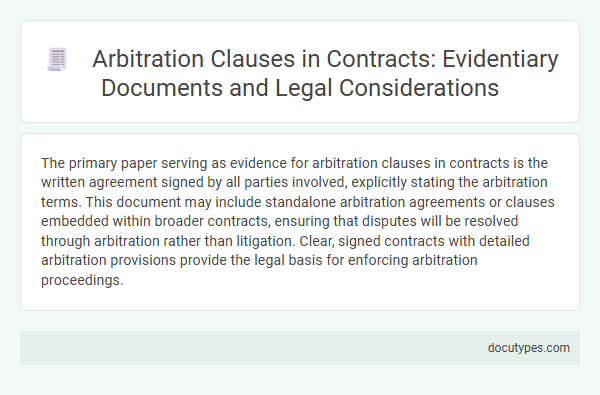The primary paper serving as evidence for arbitration clauses in contracts is the written agreement signed by all parties involved, explicitly stating the arbitration terms. This document may include standalone arbitration agreements or clauses embedded within broader contracts, ensuring that disputes will be resolved through arbitration rather than litigation. Clear, signed contracts with detailed arbitration provisions provide the legal basis for enforcing arbitration proceedings.
Introduction to Arbitration Clauses in Contracts
| Topic | Details |
|---|---|
| Introduction to Arbitration Clauses in Contracts | Arbitration clauses are provisions within contracts that stipulate disputes will be resolved through arbitration rather than court litigation. They provide a private, binding mechanism for conflict resolution, often speeding up dispute settlements and reducing legal costs. |
| Paper Serving as Evidence for Arbitration Clauses | The primary document serving as evidence for arbitration clauses is the written contract itself, where the arbitration agreement is clearly outlined. This paper usually includes explicit language specifying arbitration as the chosen method for resolving disputes between parties. |
| Additional Supporting Documents | Supplementary evidence may include signed amendments, addendums, or related correspondence that confirm or clarify the inclusion of arbitration clauses. These documents support the enforceability of arbitration agreements within the contractual relationship. |
| Importance for Your Contracts | Ensuring that arbitration clauses are properly documented in your contracts protects your interests by providing a predetermined dispute resolution path, minimizing uncertainty and litigation risks. |
Key Elements of Arbitration Clauses
Arbitration clauses in contracts serve as critical evidence that parties have agreed to resolve disputes outside of court. The key elements of these clauses define the scope, procedure, and enforcement of arbitration, ensuring clarity and legal validity.
Essential components include the clear identification of arbitration as the dispute resolution method, the specification of arbitration rules or institutions, and the designation of arbitrators or arbitration panels. The clause often details the location and language of arbitration proceedings, as well as the binding nature of the arbitration award. These elements collectively create a strong evidentiary basis to enforce arbitration agreements in legal contexts.
Legal Significance of Arbitration Clauses
Arbitration clauses in contracts hold significant legal weight as they designate arbitration as the method for dispute resolution. The written contract itself is the primary paper that serves as evidence for these clauses, ensuring enforceability in legal proceedings.
- Written Contract - The signed contract document explicitly containing the arbitration clause provides direct evidence of the parties' agreement to arbitrate disputes.
- Amendments or Addendums - Any subsequent written modifications referencing arbitration clauses can support or clarify the original agreement.
- Correspondence and Emails - Written communication discussing or acknowledging arbitration terms may serve as supplementary evidence in disputes.
You should retain all relevant contract documents carefully to safeguard your legal rights related to arbitration provisions.
Drafting Effective Arbitration Clauses
Arbitration clauses in contracts must be clearly documented to serve as effective evidence in legal disputes. Proper drafting ensures that arbitration agreements are enforceable and minimize potential conflicts.
- Written Contract - The primary evidence of an arbitration clause is the signed written contract containing the specific arbitration provisions.
- Incorporated Documents - Attachments or referenced documents that explicitly include arbitration terms can validate the arbitration clause.
- Clear Language - Using precise and unambiguous wording in the arbitration clause helps prevent misinterpretation and supports enforceability in court.
Evidentiary Documents Supporting Arbitration
Arbitration clauses in contracts require clear evidentiary documents to confirm parties' agreement to arbitrate disputes. These documents provide proof and clarity ensuring arbitration processes are enforceable and recognized.
- Signed Contract - The primary evidence is the signed contract itself containing the arbitration clause, demonstrating mutual consent.
- Written Correspondence - Emails or letters between parties that reference or acknowledge the arbitration clause serve as supplementary proof.
- Amendments and Addendums - Any written changes to the original contract specifying arbitration terms reinforce the parties' agreement on dispute resolution methods.
Enforceability of Arbitration Agreements
Arbitration clauses in contracts serve as critical evidence proving mutual agreement to resolve disputes outside court. Written contracts containing clear, signed arbitration provisions typically establish enforceability.
Courts rely on signed agreements or electronic records that explicitly mention arbitration to confirm parties' consent. You must ensure the arbitration clause is unambiguous and incorporated into the contract to withstand legal scrutiny.
Judicial Interpretation of Arbitration Clauses
Arbitration clauses in contracts are primarily evidenced by the written agreement between parties, often included within the contract document itself. Judicial interpretation emphasizes the importance of clear, explicit language outlining the scope and applicability of arbitration. Courts rely on the contractual text and related documents to ascertain intent and enforce arbitration provisions effectively.
Burden of Proof in Arbitration Proceedings
Arbitration clauses in contracts are typically evidenced by the original signed agreement or any written document explicitly containing the clause. In arbitration proceedings, the burden of proof lies with the party seeking to enforce the arbitration clause, requiring them to present clear and convincing evidence of the clause's existence and applicability. Courts and arbitrators rely heavily on the contract text, correspondence, and any related documents to determine the validity and scope of the arbitration provision.
Challenges to Arbitration Clauses in Court
What paper serves as evidence for arbitration clauses in contracts? Arbitration clauses typically appear in the written contract or as an addendum signed by all parties involved. Courts review these documents to verify the existence and terms of the arbitration agreement during disputes.
What challenges to arbitration clauses arise in court? Parties often contest the validity, scope, or enforceability of arbitration clauses, citing issues like unconscionability or lack of mutual consent. Courts analyze contract language, negotiation history, and applicable laws to resolve such challenges.
What Paper Serves as Evidence for Arbitration Clauses in Contracts? Infographic

